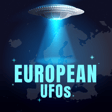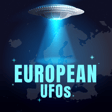
18: UAP Coalition Netherlands
In this episode, I speak with Joachim Dekkers, the founder of UAP Coalition Netherlands. We delve into his journey, starting with how the 2017 New York Times article about U.S. Navy pilots encountering UAP sparked his interest. Joachim shares how this curiosity led him to explore similar cases in Europe and ultimately form a coalition focused on UAP from the perspectives of law enforcement, aviation, and military professionals.
Our conversation covers his mission to remove the stigma surrounding UAP experiences and his push for serious research and cooperation with government bodies. We discuss the coalition's work with European institutions, the importance of flight safety, and efforts to improve UAP reporting across Europe.
Overall, this episode offers a fascinating look at how personal ambition can evolve into a full-scale movement aimed at fostering transparency and policy change in the realm of UAP.
UAP Coalition Netherlands: https://uapcoalitienederland.nl/en/
Get in touch with the show
Twitter/X: @EuropeanUFOs
Instagram: europeanufos
Facebook: European UFOs
Email: europeanufos@gmail.com
Support the podcast to keep it ad-free: https://www.buymeacoffee.com/europeanufos

